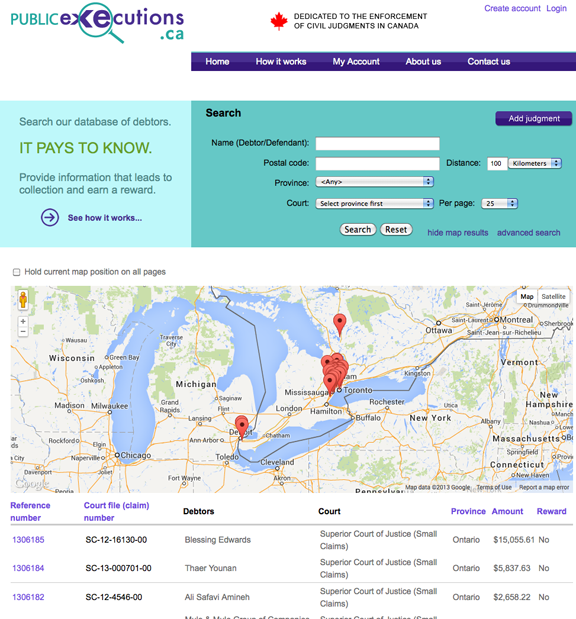An Ontario paralegal is hoping to help creditors enforce judgments in their favour through an aptly named web site,
publicexecutions.ca, that allows them to name and shame those who owe them money.

“That’s part of what it’s about is to name and shame,” says Dougall Grange, founder of Public Executions Inc. in Newmarket, Ont.
The focus of the site is on unenforced monetary judgments. For a fee of up to $100, creditors or their legal representatives can sign on to the web site and provide information about their case.
“We use the same technique as Facebook or LinkedIn,” says Grange, who has worked as a private investigator. “Every debtor gets his own page and his own URL, which makes him visible on the Internet.”
As a result, the debtor becomes highly visible on Google searches, he notes.
The obvious pitfall, of course, is around the reliability of the information and potential legal liability for false postings. To address that, the web site creates an affidavit after the creditor provides information such as the name of the file and the courthouse in question.
In addition, the affidavit includes a provision that the information is true and requires users to abide by a number of rules, including a commitment to take the information down once they get their money.
“This is public information,” says Grange, who notes it’s “easily verifiable” through the file and courthouse details.
“There’s control over the information and it’s very important to me that the information that gets on this site is reliable.”
The idea, then, is to help creditors get their money by providing an incentive for debtors to pay up given the public attention or by offering a vehicle for people to provide tips on where they may be.
“You may say everybody is entitled to privacy, but I say judgment debtors are not entitled to privacy,” says Grange, noting tips such as where a debtor is working may lead to enforcement through a garnishment order.
So far, Grange says the site has about 250 files, some of which are on behalf of his own clients. The need for it, he adds, is the lack of easily accessible information about unenforced judgments and the challenge of finding debtors. The site responds to that through what he calls a crowdsourcing platform by collecting information from the creditors themselves and then creating a vehicle to encourage debtors to pay up or locate them.
There’s no guarantee, however, of quick success. Even with new information on the case, it’s still not always easy to get the court file and the debtor may have moved on by the time the creditor takes enforcement action.
“The roadblock is our system,” says Grange.
But he adds: “If you are looking for eventual gratification, we’ll get it done.”

 “That’s part of what it’s about is to name and shame,” says Dougall Grange, founder of Public Executions Inc. in Newmarket, Ont.
“That’s part of what it’s about is to name and shame,” says Dougall Grange, founder of Public Executions Inc. in Newmarket, Ont.